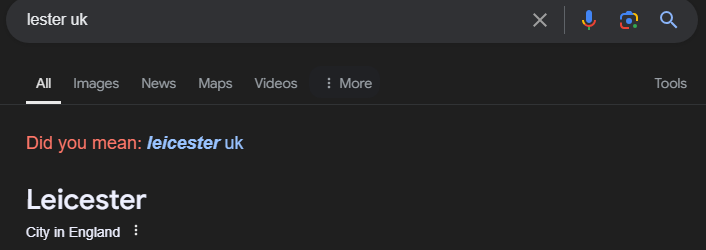- cross-posted to:
- linguistics@mander.xyz
- cross-posted to:
- linguistics@mander.xyz
xkcd #2942: Fluid Speech
Alt text:
Thank you to linguist Gretchen McCulloch for teaching me about phonetic assimilation, and for teaching me that if you stand around in public reading texts from a linguist and murmuring example phrases to yourself, people will eventually ask if you’re okay.
I once met a girl in a bar who spoke such absolutely perfect and grammatically correct German she did sound like an alien impersonating a human.
Or someone who very much wants to show that she’s better than you.Turns out she wasn’t from Germany at all. She was an immigrant from Slovakia, who had learnt German at such a high level that it sounded weird.
I’ve had Americans ask me the meaning of words I’ve used in a sentence. Like “what’s tranquil?” (I’m non-native.)
I blame reading.
Speaking English using French vocabulary is a real cheat code
English speakers can really enhance their vocabulary when they know French. English does have a lot of French words that most people don’t use anymore but if you use them, your vocabulary becomes off-the-charts intellectual.
Removed by mod
I was thinking more of Spanish, but yup. Same thing.
Yeah, coming from Portuguese, I know by hearth all of the refined vocabulary to be found in English.
But the mundane is a whole other world.
Like “bamboozled”!
Anglo-language conversations plus Franco-vocabulary utilization, remains a veritable trick code
De rien
I once did an English language vocabulary test that yielded that I’m amongst the top 0.01% in terms of amount of English-language vocabulary.
English is not my mother tongue and I still and often make mistakes in the use of “in”-vs-“on” or even in certain forms of past tense.
However I read a lot in English, in various areas of knowledge, plus it turns out lots of really obscure words in English are pretty much the same as a the word in some other language I know or even pretty much the Latin word, so when I didn’t know that was the English word for that, I can often guess the meaning.
All this to say that I absolutelly agree with you that it’s a reading thing, plus at more specialized language level, the “knowledge of foreign languages” also has some impact.
Got called a rich kid for knowing the word “carafe.” Pretty sure I learned it from a book, my parents didn’t have carafe with mountain spring water or some shit around the house.
I learned it trying to fix a coffee maker. It’s news to me that it ain’t a coffee specific word.
The term “carafe” puts me in mind of a crystal glass container of between half a litre and two litres of volume for wine or water. What is it in relation to coffee? The glass bowl the coffee drips into in one of those dripping coffee makers?
Exactly that. I picture it as one of those big jugs on an industrial coffee machine with the black or orange plastic to indicate if it has caffeine
I learned that word from my dad when I was a child. we kept a carafe in the refrigerator designated for water. It’s a wine carafe but can put anything in it. My dad was an alcoholic so he had a wine carafe and a lot of other alcohol-related accoutrements like beer steins.
Removed by mod
Removed by mod
I’ve been learning German too myself, and the thing that the traditional language courses don’t teach you is the way natives speak. Listening to actual German speakers was pretty much alien to me even after two years until I bumped into a couple Easy German videos where they touch the very same subject as this xkcd and that actually got me listening to certain parts of speech more carefully and that way also understand it better.
Now I actually find myself doing the same shortcuts sometimes when I’m progressing with the skill. It’s the same with English since I have to use it daily at work even though I’m not a native speaker. Funny how the languages work in real life vs. in theory.
My wife being bemused I don’t understand french in Paris after learning french for 3 years. Dude, they speak such sloppy french I’m impressed they understand each other.
Agreed…I was especially impressed after I learned about their Verlan. As far as I can tell it’s basically pig Latin that they take seriously and use regularly as slang? As a quick example, the word Verlan is Verlan for l’envers. They can keep their secrets I guess haha.
I think Verlan is pretty neat. We had a full lesson on it in middle school because of one of our country’s most popular musicians, Stromae, which is Verlan for Maestro.
Fantastic! Stromae is actually the reason I learned verlan existed! I got to see him live in the US, and it was one of the coolest live shows I’ve ever seen. The majority of the video for quand c’est is an actual part of the live show, and I wasn’t expecting it at all
Wait, Verlan is l’envers, stromae is maestro… Is this Verlan thing just like Rioplatense Spanish’s Vesre? (Vesre basically means revés i.e. inverse)
EDIT: Just looked it up on Wikipedia and it turns out this phenomenon happens in a number of languages: Riocontra in Italian (riocontra -> contrario), Podaná in Greek, Šatrovački in Serbia, Totoiana in Romanian.
Lol is that what happens when they have an official institute that dictates correct French? “Oh it’s not slang, it’s verlan!”
Is that a pun on l’inverse?
Joseph Justus Scaliger said something similar about Basque in the 17th century:
C’eſt un langage eſtrange que le Baſque… On dit, qu’ils s’entendent, je n’en crois rien
Basque is a strange language… It is said that they understand one another, but I don’t believe any of it.
Ah, and they’re not the worst haha.
deleted by creator
Hah, I’ve seen it years ago. Classic.
I didn’t get it until I started trying to say “hot potato” in the middle of a sentence, like “Look out! Hot potato incoming!”
The ‘t’ in “hot” became more and more like a glottal stop as my tongue started to touch the gums of my top front teeth less and less.
Still, I don’t think I could uncover that alien impersonator.
“I’m goa have some hot potato.”
Too me the “t” (at most) emphasises the hotness. Am I wrong?
The alien impersonator was me all along! HAHAHA!!!
I mean, seriously, I am not a native English speaker, but even with my weird English accent, it only became weirder if I try to speak fast while keeping the emphasis on that ‘t’ at the end of “hot”. My native accent also probably lends to that glottal stop taking over the ‘t’ and merging it with the upcoming ‘p’ sound. It also helps that the two sounds (glottal stop and the bilabial ‘p’) are on opposite sides of my mouth, so I can quickly sound them in succession. The end result sounded to me like an exaggerated “posh British” rendition, as if the alien watched way too much BBC before invading Earth.
It just sounded way weirder than I otherwise would be. I can’t really describe it.
Are you the alien? Nobody calls a potato for eating hot potato… If you’re eating a potato it’s going to be hot. Hot potato is referring to the game where you pass something along very quickly. It’s saying you’re all passing something along that no one wants to get caught with or stuck with, and it’s almost never literally, it’s usually taking about a responsibility being passed or something like that.
Removed by mod
No, fellow human. Of course I am not the alien. Ha, ha, ha. You are funny and I would be pleased to talk with you another time in the future. Ha, ha, ha. Good bye.
I get as far as the third panel. Anything beyond that is drunk speak
I thought the same at first, but then I tried actually saying it out loud. “Yeah, I’m just gonna go to the shops”. And I actually think Munroe has it right here, at least for my accent. If I had been asked to say it and carefully analyse it myself, I probably wouldn’t have noticed at all that I was eliding more than “going to” to “gonna”. And if I had noticed, I still probably would have analysed it as (and I’m using Hangul here because frankly I don’t know how to spell out the vowel in the Latin alphabet in a way that actually makes sense) 근 (basically “gun”, but with a lazier vowel). But it’s definitely been elided down to a single syllable.
The key thing is that this only happens when putting it into the middle of a full sentence. If it’s the only word I say, it stays “gonna”.
edit: wait 🤦♂️. I can use IPA. I’d have analysed it as /gən/ But realistically, Munroe’s /gә̃/ is probably more accurate.
I can only get to /gә̃/ if I make an effort to say it faster than I ever actually talk. Otherwise, it definitely always has that “n” sound in there.
Yeah, “gon’” seems about the most efficient form of “going to” that would be recognizable.
Going to > gonna > gon’
I guess if you’ve lived anywhere where speech has drifted a little hillbilly this version is just daily speech rather than any need for speed.
Nice. There’s lots of areas I’ve lived where the locals drop specific consonants from the names of places. So anyone who actually pronounces the place name “correctly” is immediately recognized as new to town.
I can only think if Toron(t)o. Never really thought about other towns doing the same thing.
When I hear someone from that city say their city’s name, it sounds like it should be spelled “Trono.”
Shibboleths are amazing! Calgary is almost universally pronounced “Cal-Gary” by non-locals, locals say “Calgree”
I’m gonna have to disagree with you. Have you ever seen a Shoggoth? They’re horrific and just because they’re protoplasmic beings doesn’t mean their mispronunciation of English should be celebrated.
Vangcouver. =] Also every city in Australia.
deleted by creator
Like the other reply said, it’s all over the place in Australia. You can easily tell a tourist—especially an American tourist—because they’ll say “can-bair-a” instead of “can-bruh”.
It’s not unusual in the UK, too. Worcester is Wost-er, Magdalen(e) is mawd-lin, and Leicester is lester.
OMG, that makes it so much worse. If someone tells you about a specific place, and you want to look it up later, you have absolutely zero chance of ever spelling it correctly. Good luck typing lester or woster in Wikipedia or Maps.
As it happens, that worked just fine:

Worcester is famous even outside the UK because of Worcestershire sauce (pronounced “woster-shuh” sauce), the condiment named after the region. And because the name is on the bottle, it’s easy for people to remember.
We have a Bradenton nearby which gets shortened to branton (pronounced like brain-nton). Gotta have the long A or else you’ll accidently send someone half an hour away to Brandon.
Oh that’s just great. Two similar place names like that, and they also happen to be relatively close to each other. I can see how that could cause some confusion.
Similarly, Kuhmo and Kuhmoinen (both in Finland) are about 446 km apart, but you can easily avoid the confusion as long as you know roughly which part of the country you’re talking about.
There’s also Helsingborg (town in Sweden) and Helsinfors (swedish name for the capital of Finland). What could go wrong.
Removed by mod
Louisville becomes Luhvul
Oregonian checking in here.
See, my middle name ends with an S and my last name begins with an S… and my middle name is a pluralized name, so nobody hears the S when I say it in conjunction with my last name. So I’ve gotten really good at pronouncing the S, stopping for a beat, then saying my last name, without it sounding super weird or robotic.
So properly pronouncing “hot potato” while enunciating the first T doesn’t seem too challenging to me.
This is some riddle shit I can’t figure out
deleted by creator
Thanks so much! I always sucked at riddles I couldn’t come up with anything lol
We English wouldn’t only drop the first t, we’d drop the h and the final t as well, 'o pota’o… innit
And in my experience (or at least how I as a foreigner was taught the English RP pronounciation), often also the spaces between words.
Removed by mod
Hop-tay’doh
Subscribe, I love these
Haw’potado
Phonetically, it’s exactly right, but It visually reads like the name of a Vulcan side character from an episode of star trek
As a non native English speaker, I had to read your comments to understand the “Hot potato” one… Seems that I’m not as fluent in English as I thought (my accent is shit)
“hu- p-taydoh”
Amusingly, just a couple of days ago we had a post about this same phenomenon in !ausmemes@aussie.zone.
Djeet?
No, djou?
Removed by mod
deleted by creator
Hop-pa-taydo
Also, the phrase “I’m going to” is often shortened to “I’mma” or “I’m ‘onna”. When referring to oneself, we tend to drop the G entirely
like this example for Imma be there.
deleted by creator
And in my case, it’d be more like /gna/. And yes I do pronounce the “t” in hot potato.
I feel like it’s the glottal T. I know for me, personally, my tongue doesn’t touch my teeth, but there is still a T sound. I am not British, though I am from Jersey (New).
My tongue definitely touches the teeth/roof of mouth there. I do swallow the vowels though.
I am from Jersey (New) too, and we love our our glottal stops. Once I was telling someone from out-of-state that I was from Trenton, and even after I said it three times, they still said they’d never heard of it. And I realized it’s because we pronounce it almost like “chre’in”. I don’t really pronounce the “nt” in the middle, it’s just a gap.
Removed by mod
How do you know that no-one enunicates the t sound? I just asked my partner to say hot potato and she definitely does.
Removed by mod
I don’t need to, i know she that correctly. There are definitely words we pronounce incorrectly but nit that one. You and the OP are conflating your local experience for a global one. I don’t live in the US, we enunciate differenrly
Removed by mod
Bullshit
Well, the only way to check beyond me muttering at myself would be to have a recording of me talking casually about hot potatoes :D
And yeah, I definitely pronounce “could you” as “couja” when relaxed. Hanging out with people from different countries makes you pretty conscious about your accent some times. Mostly when half the voice chat can’t understand what you just said and the other half can’t understand why they’re having an issue.
Removed by mod
I’d say part of this is the intended / official descriptipn isn’t actually that. The spoken word existed first, then someone tried to capture that spoken word using a finite list of characters and character combinations that map back to phenomes. The written word isn’t phonetically accurate to the letters it is composed of, and the written word is just close approximation of the spoken word itself.
Removed by mod
Yeah, as I said my awareness is just “people make fun of my accent some times” (and I make fun right back, it’s that kind of a friend group).
My six year old daughter is getting the hanging of the spelling and whatnot, but earlier on in her Kindergarten year, words like “driver,” to her, started with a J. I had never thought about it, but it absolutely (at least in our NJ dialect) has a J sound, because, as you say, we all talk fucked up (paraphrasing).
Removed by mod
You pronounce the t in hot and then pronounce the p of potato?
Yeah. If I try going faster, it turns into “ht’ptayto”. Like a hard stop with tongue against the roof of the mouth before the teeth.
Although admittedly, this is self-reporting.
I’m sitting here trying to replicate what that sounds like from your description and I’ve only succeeding in sounding like a madman.
Different accents, then.













